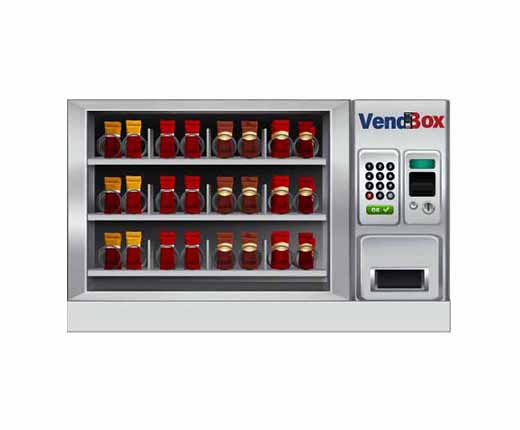The Future of Home Storage: A Shift Towards Automation
The way we store and access food at home has remained relatively unchanged for centuries. From traditional wooden cabinets to modern smart refrigerators, pantries have always played a crucial role in our kitchens. However, as technology continues to evolve, a new contender is emerging—mini vending machines. Once confined to office break rooms, schools, and public spaces, these automated dispensing units are now making their way into households. But could they eventually replace traditional pantries?
The Rise of Smart Mini Vending Machines
Mini vending machines are compact, smart appliances designed to store, organize, and dispense food and beverages with minimal effort. Unlike conventional pantries that rely on manual stocking and retrieval, these machines use automation, artificial intelligence (AI), and smart inventory management systems to enhance convenience.
Several technology companies are already experimenting with household-friendly versions of vending machines that can sync with grocery delivery services, detect expiration dates, and personalize recommendations based on consumption patterns. As more homes embrace automation, the idea of replacing static shelves with dynamic, responsive storage solutions is becoming increasingly plausible.
Why Mini Vending Machines Could Be the Future of Home Pantries
Smart Inventory Management
One of the primary advantages of mini vending machines is their ability to track inventory in real time. With built-in sensors and AI algorithms, these devices can monitor the quantity and expiration dates of stored items, sending alerts when supplies are running low. This not only reduces food waste but also eliminates the inconvenience of running out of essential ingredients unexpectedly.
Personalized Food Suggestions
Advanced vending machines leverage AI-driven analytics to study household eating habits and suggest grocery lists accordingly. If you frequently consume a particular type of snack or beverage, the machine can reorder it automatically or suggest healthier alternatives based on your dietary preferences. This level of personalization enhances the overall culinary experience.
Space Optimization
Traditional pantries often become cluttered with expired goods, duplicates, or hard-to-reach items. A vending machine, with its compartmentalized design, ensures that every item is neatly organized and easily accessible. For homes with limited kitchen space, a compact automated pantry could prove to be a game-changer.
Enhanced Hygiene and Safety
With increasing concerns about food safety and hygiene, mini vending machines offer a sealed, controlled environment that protects items from pests, dust, and contamination. Some models even feature UV sterilization and temperature control, ensuring perishable goods remain fresh for longer periods.
Integration with Smart Homes
As smart home ecosystems continue to expand, mini vending machines can seamlessly integrate with voice assistants, smart fridges, and home automation systems. Imagine asking Alexa or Google Assistant to dispense a snack or suggest a recipe based on available ingredients. The possibilities for convenience and connectivity are endless.

Challenges and Considerations
Despite their numerous advantages, mini vending machines are not without challenges. Widespread adoption will depend on factors such as affordability, consumer adaptability, and long-term sustainability. Here are some potential hurdles:
Initial Cost and Maintenance
Unlike traditional pantries, which require no electricity or advanced technology, mini vending machines come with an upfront cost and ongoing maintenance requirements. While prices are expected to decrease as the technology matures, affordability remains a key concern for many households.
Customization Limitations
Current vending machine designs cater mainly to standardized product sizes and packaging. Unlike a pantry, which can store everything from bulk grains to irregularly shaped vegetables, vending machines may struggle with accommodating diverse grocery items. Overcoming this limitation will require innovations in modular storage and adaptive compartment designs.
Energy Consumption
Pantries are passive storage spaces that do not consume electricity, whereas mini vending machines rely on power for automation, refrigeration, and connectivity. As the world moves towards energy efficiency, developing low-power solutions will be critical for mainstream acceptance.
Cultural Preferences and Behavioral Adaptation
Many cultures have deep-rooted traditions related to food storage and preparation. The transition from traditional pantries to automated vending systems may not be universally accepted, especially in households that value hands-on cooking and ingredient selection. Encouraging adoption will require gradual integration and user-friendly designs.

The Road Ahead: Evolution, Not Replacement
While mini vending machines hold significant promise, they are unlikely to replace traditional pantries entirely—at least not in the immediate future. Instead, they may serve as complementary storage solutions that enhance efficiency, particularly in urban homes, small apartments, and tech-savvy households.
Companies like Panasonic, LG, and emerging startups are already exploring hybrid models that combine elements of smart refrigeration, automated storage, and AI-driven inventory tracking. These innovations indicate that the future of home pantries will likely involve a blend of conventional shelving and intelligent automation. Read More>>>
A Glimpse Into the Smart Kitchen Revolution
The concept of mini vending machines replacing traditional pantries is not as far-fetched as it may seem. As technological advancements continue to shape our daily lives, integrating automation into food storage is a natural progression. While challenges remain, the potential benefits of smart inventory management, personalized recommendations, space optimization, and enhanced hygiene make mini vending machines an exciting prospect for modern homes.
Ultimately, the shift towards automated storage solutions will depend on consumer demand, affordability, and cultural acceptance. Whether as a complete replacement or an innovative supplement, one thing is clear: the future of home pantries is set to become smarter, more efficient, and undeniably futuristic.
1 thought on “Can Mini Vending Machines Replace Traditional Pantries in Homes?”